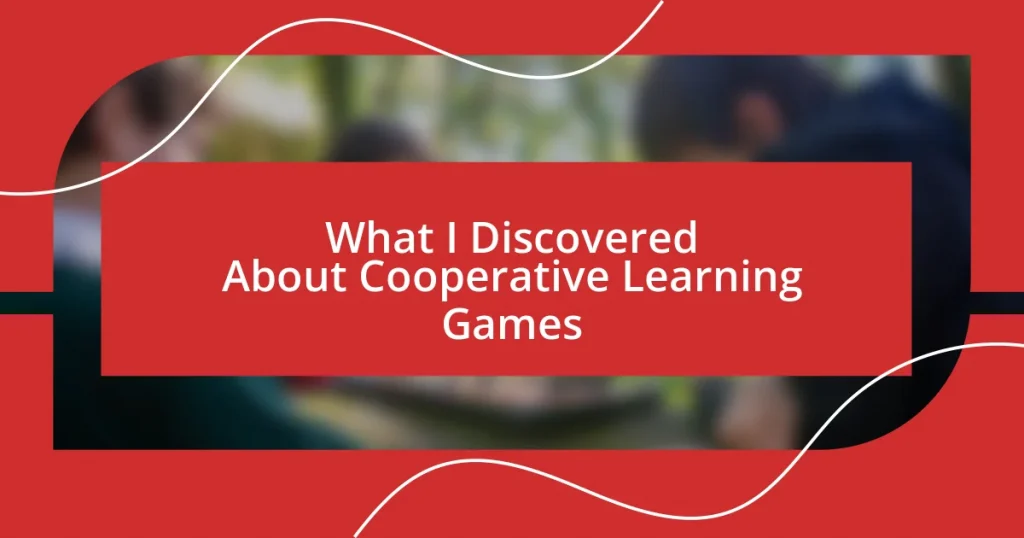Key takeaways:
- Cooperative learning games foster teamwork, enhance problem-solving skills, and build emotional intelligence through collaborative experiences.
- Key elements for effective games include clear objectives, structured interactions, and post-game debriefing to maximize learning and reflection.
- Creating a supportive atmosphere and incorporating feedback loops during gameplay enhances engagement, trust, and continuous improvement among participants.
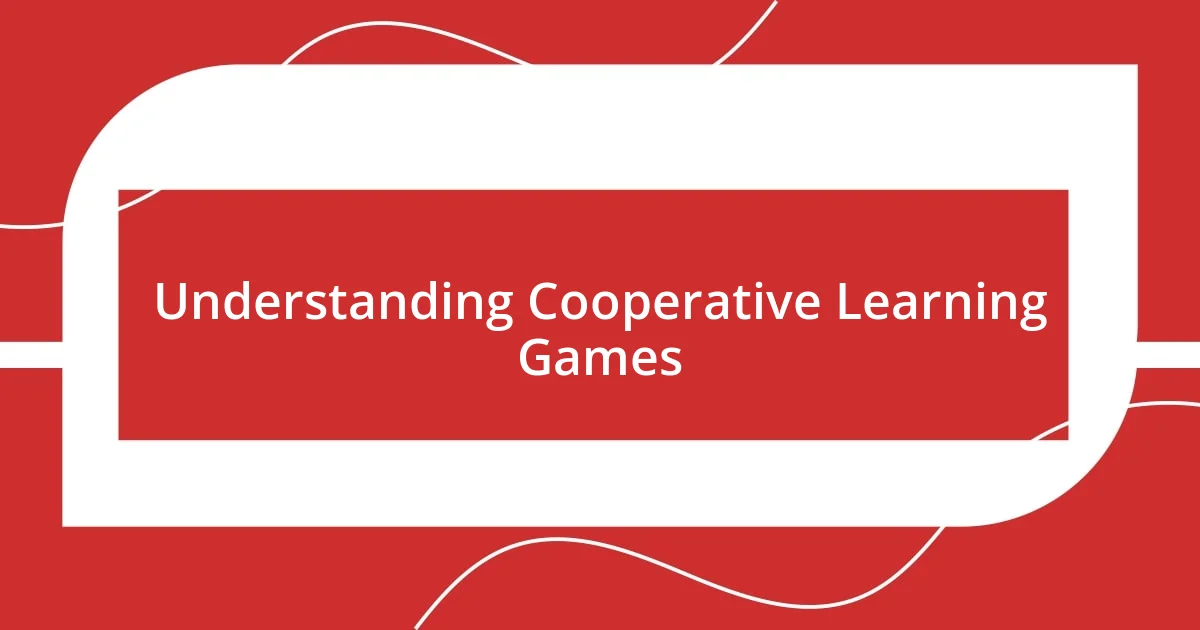
Understanding Cooperative Learning Games
Cooperative learning games are fascinating tools that transform traditional learning into a collaborative journey. I still remember the first time I participated in a group puzzle challenge; we strategized, communicated, and built not just the puzzle but also a sense of camaraderie. Isn’t it amazing how a simple game can reveal the power of teamwork and enhance critical thinking skills?
In my experience, these games foster an environment where everyone’s voice is valued. I recall a tension-filled moment during a competitive game where we had to brainstorm ideas. Instead of competing against each other, we ended up supporting one another through encouragement and shared strategies. It struck me how vulnerability and openness could be catalysts for growth among players—how often do we allow ourselves to embrace that in other settings?
What truly stands out about cooperative learning games is their ability to cater to diverse learning styles. I’ve seen quieter students flourish when they feel included in collaborative efforts, illustrating that engagement can happen in various forms. Can you think of instances where collaboration brought out the best in you or your peers? These games not only teach concepts but also build emotional intelligence and social skills that are essential in today’s interconnected world.
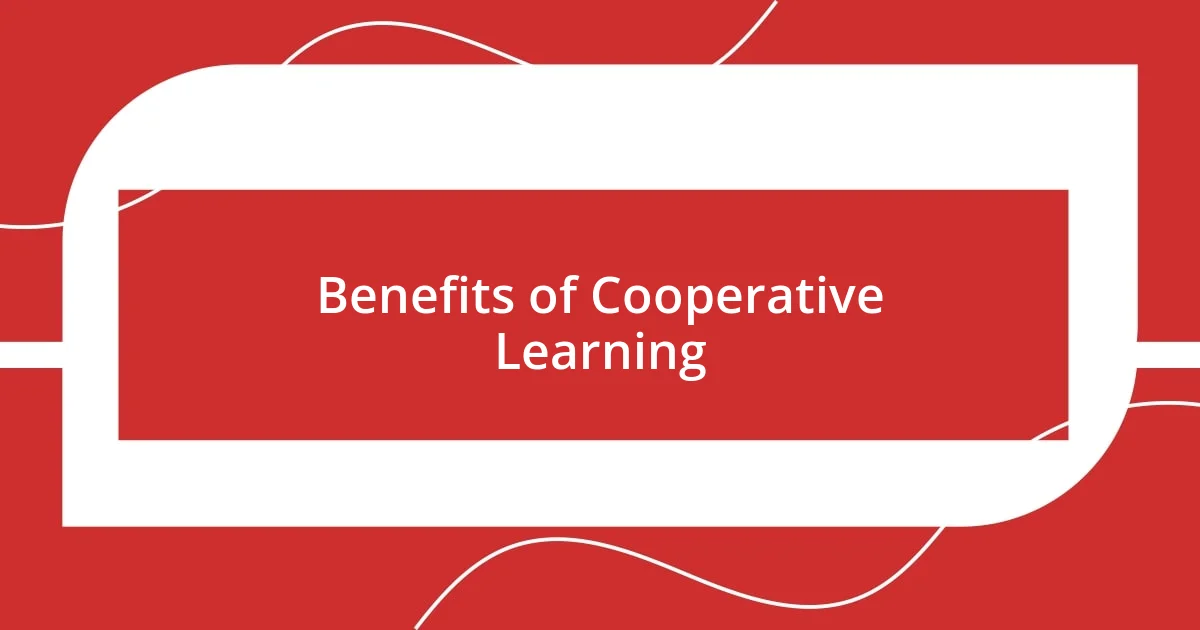
Benefits of Cooperative Learning
The beauty of cooperative learning lies in its ability to build stronger relationships among participants. During a recent team-building exercise, I witnessed how quickly tensions skidded away as everyone realized the shared goal. The collective effort to solve challenges brought laughter, lightness, and a new level of trust that was simply transformative. It’s incredible how these moments of collaboration can weave bonds that extend beyond the activity.
Another significant advantage is the enhancement of problem-solving skills through collaboration. I recall an instance during a math-related cooperative learning game where we tackled complex problems as a team. Instead of feeling frustrated, we learned to draw on each other’s strengths, providing unique perspectives that I couldn’t have accessed alone. I realized that this shared approach not only leads to solutions but also cultivates a deeper understanding of the subject matter.
Finally, cooperative learning games instill a sense of accountability among participants. When everyone contributes to the team’s success, the pressure to perform shifts from individual to group. I remember vividly when our team faced a deadline for a project and how motivating it was to see each member step up. It reinforced the idea that we were all equally responsible for both our progress and the outcomes. That feeling of unity can incredibly boost motivation and commitment—what’s not to love about that?
| Benefit | Description |
|---|---|
| Stronger Relationships | Fosters trust and camaraderie through shared goals and activities. |
| Enhanced Problem-Solving Skills | Encourages collaboration to explore diverse perspectives and solutions. |
| Increased Accountability | Shifts focus from individual performance to group success, boosting motivation. |
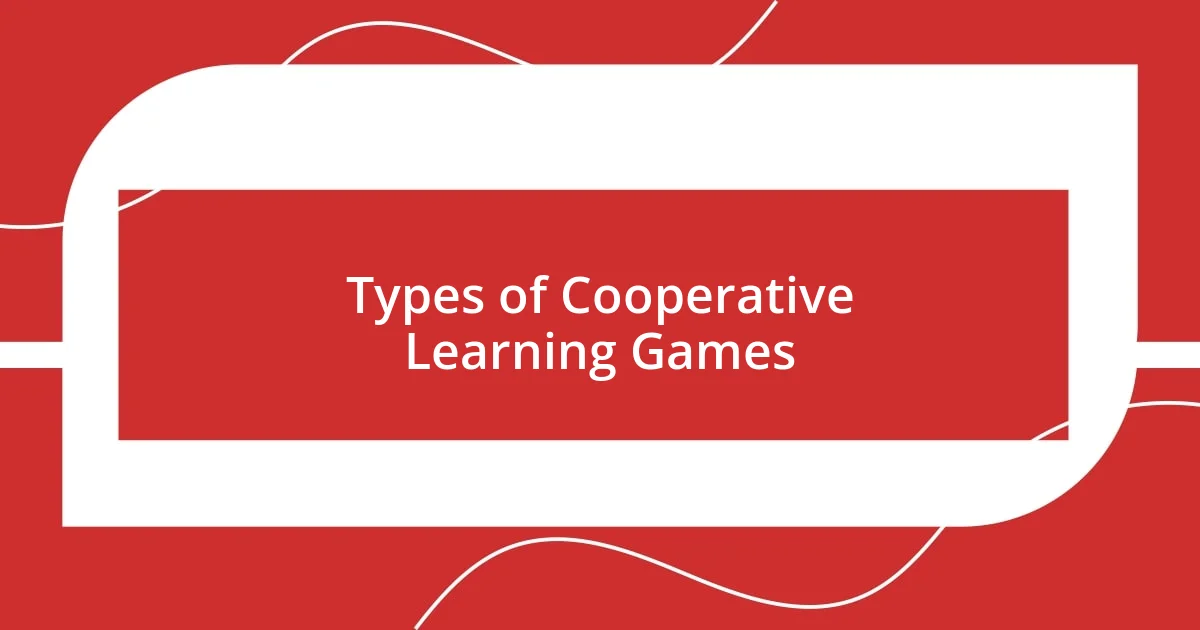
Types of Cooperative Learning Games
Cooperative learning games come in various forms, each offering unique experiences that can enhance group dynamics. I’ve found that activities like team-building puzzles not only sharpen our problem-solving skills but also reveal individual strengths in unexpected ways. Participating in a scavenger hunt once opened my eyes to the creativity and resourcefulness of my teammates—each clue we solved brought us closer together, transforming a simple search into an opportunity for growth and connection.
Here’s a quick list of some types of cooperative learning games:
- Team-building Exercises: Activities aimed at fostering trust and camaraderie.
- Scavenger Hunts: Creative problem-solving adventures that encourage teamwork.
- Group Puzzles: Challenges that develop critical thinking and collective strategizing.
- Role-Playing Games: Simulations that enhance communication and empathy among players.
- Collaborative Storytelling: An activity that promotes creativity by allowing participants to build a narrative together.
These diverse types invite participants into a realm where collaboration reigns, making learning not just informative but genuinely enjoyable, a sentiment I cherish from every gaming experience I’ve had.
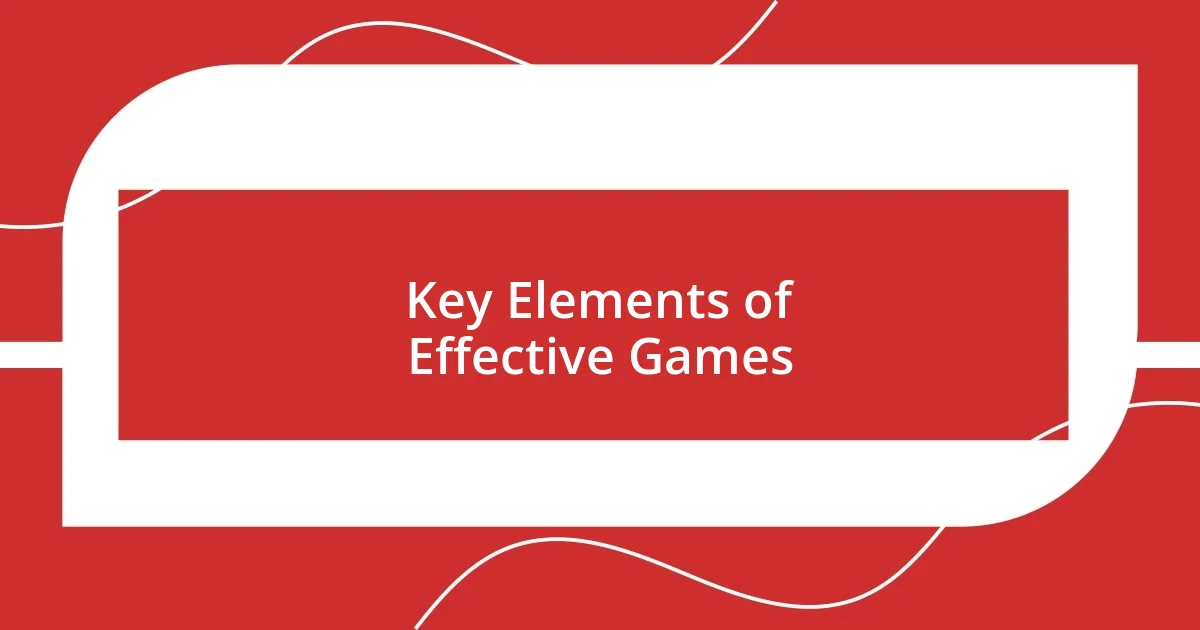
Key Elements of Effective Games
When considering what makes games effective for cooperative learning, one key element stands out: clear objectives. I remember a time during a cooperative game where our goal was to create a product prototype. The clarity of our objective was crucial; it guided our discussions and kept everyone focused. Without that shared purpose, it would have been easy to drift into confusion or frustration. Isn’t it fascinating how a simple goal can align diverse minds?
Another element that I’ve found to be invaluable is the structure of the games themselves. The design should allow participants to engage in meaningful interactions and provide opportunities for everyone to contribute. I once participated in a game that involved building a tower using limited resources. The diverse contributions from each of us were vital for success, highlighting that everyone’s input mattered. Have you ever experienced a moment where the collective effort generated something extraordinary? Those moments of synergy create an exhilaration that’s hard to replicate.
Lastly, the role of debriefing after the game can’t be overlooked. Reflecting on our team dynamics and the strategies we employed deepened my understanding of the process. After one particularly challenging game, we gathered to discuss what worked and what didn’t—turning missteps into learning opportunities. It’s eye-opening how these discussions can elevate the entire experience, transforming a fun activity into a profound learning journey. How often do we take the time to unpack our experiences to truly grasp their significance?
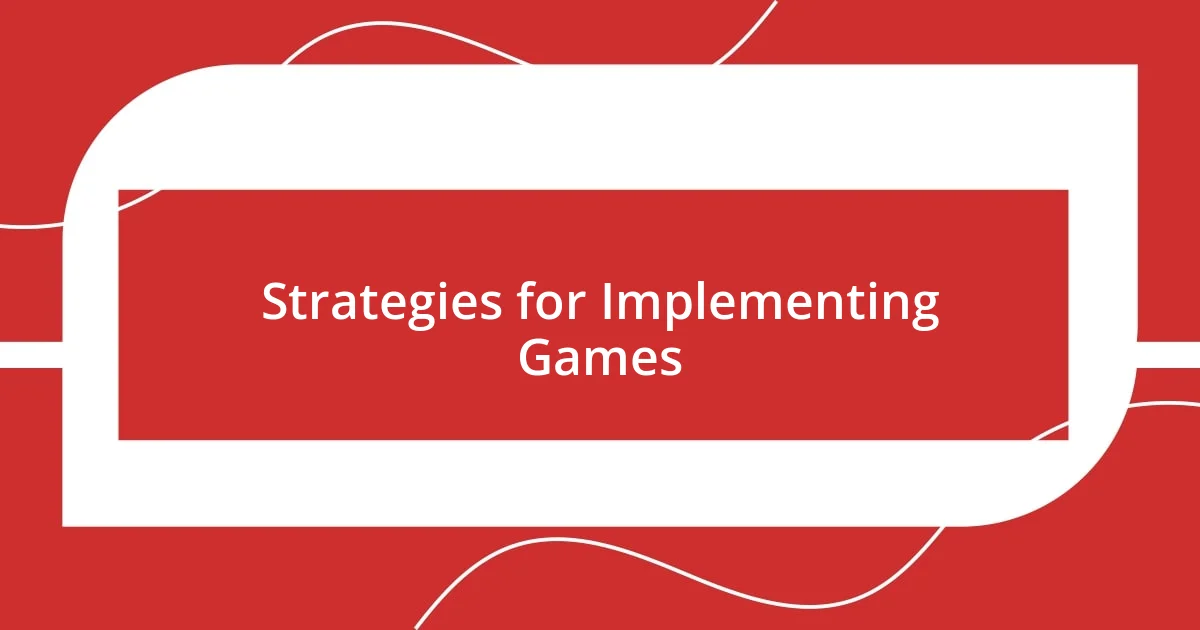
Strategies for Implementing Games
When it comes to implementing cooperative learning games, I’ve discovered that setting the right atmosphere is vital. Creating a space where everyone feels safe and valued can encourage open participation. I once facilitated a game where we sat in a circle, and the relaxed vibe made it so easy to engage without the pressure of typical competitive environments. Isn’t it amazing how the right setting can unlock genuine collaboration?
Another strategy that I’ve found incredibly effective is to start with smaller, less complex games. This allows the group to warm up and build trust without feeling overwhelmed. I recall introducing a simple icebreaker game that involved sharing fun facts about each other. As we laughed and revealed quirky tidbits, it broke down barriers almost instantly and set the stage for more challenging tasks. Have you ever noticed how those light-hearted moments can create a lasting bond?
Finally, incorporating feedback loops during the game can significantly enhance learning outcomes. I learned this lesson while playing a strategy-based game where our team was encouraged to adjust our tactics after each round based on our performance. The ability to refine our approaches in real time not only sharpened our skills but fostered a sense of ownership over our learning. How often do we get to track our progress and celebrate small victories while striving for improvement? It truly transforms the entire experience into a dynamic journey of growth and discovery.
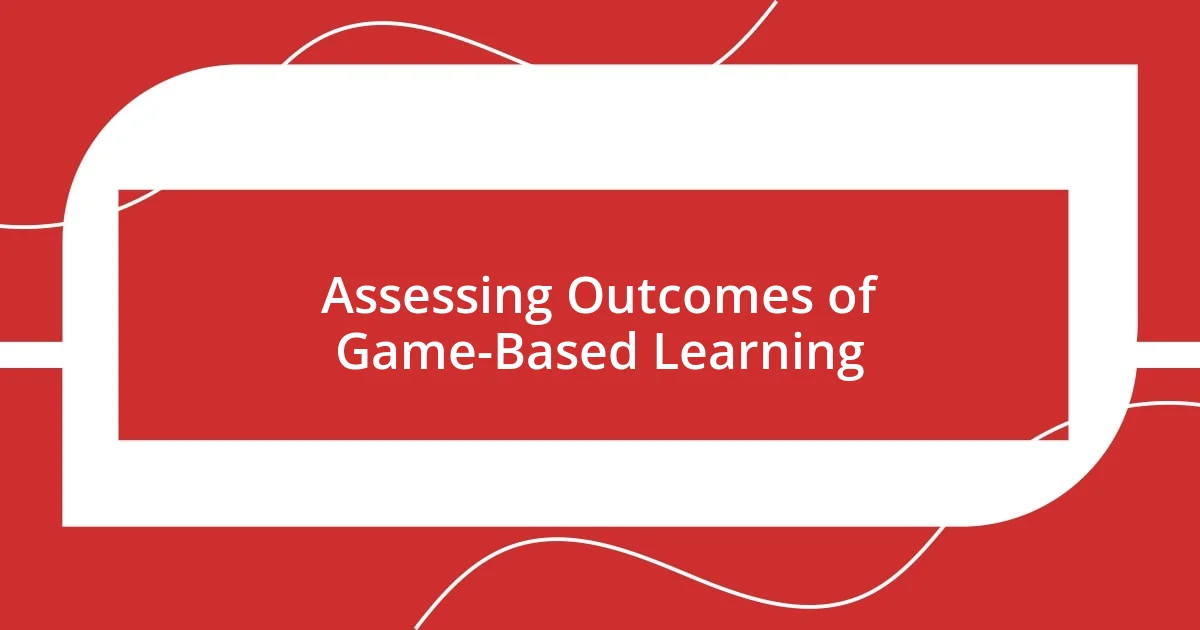
Assessing Outcomes of Game-Based Learning
Assessing the outcomes of game-based learning requires more than just a smile when the game ends. I remember participating in a team project where we used a simulation game to navigate complex market scenarios. Afterward, we not only celebrated our victories but also analyzed the strategies we employed. It was in these moments of reflection that I truly understood the game’s impact on our critical thinking and decision-making abilities. Have you ever left a game feeling not just entertained, but also transformed in your understanding?
Another crucial aspect is measuring various learning outcomes, like teamwork and problem-solving skills. I often find it intriguing how participants can develop these skills without even realizing it during the game. For instance, I once played a cooperative game focused on resource management. As we tackled challenges together, I noticed my teammates naturally stepped into roles that played to their strengths—some as negotiators, others as strategists. Isn’t it remarkable how games can reveal hidden talents and foster a collaborative spirit?
Finally, it’s essential to collect actionable feedback for continuous improvement. After one intense competition, my team and I conducted a survey to gauge everyone’s experience and the skills they felt they had developed. This collective introspection helped us identify areas for growth, not just in our gameplay but also in our interpersonal dynamics. How often do we really take the time to evaluate our learning experiences? This process turned our enjoyment into a deeper understanding, enhancing our future collaborative efforts.









